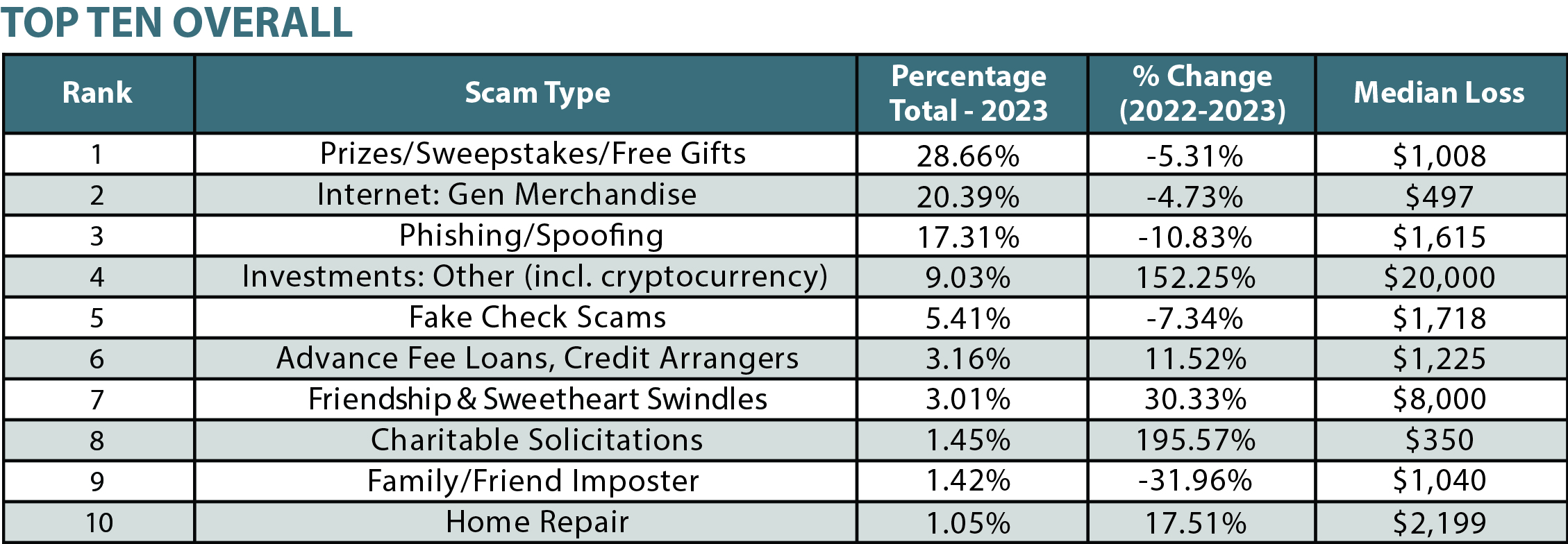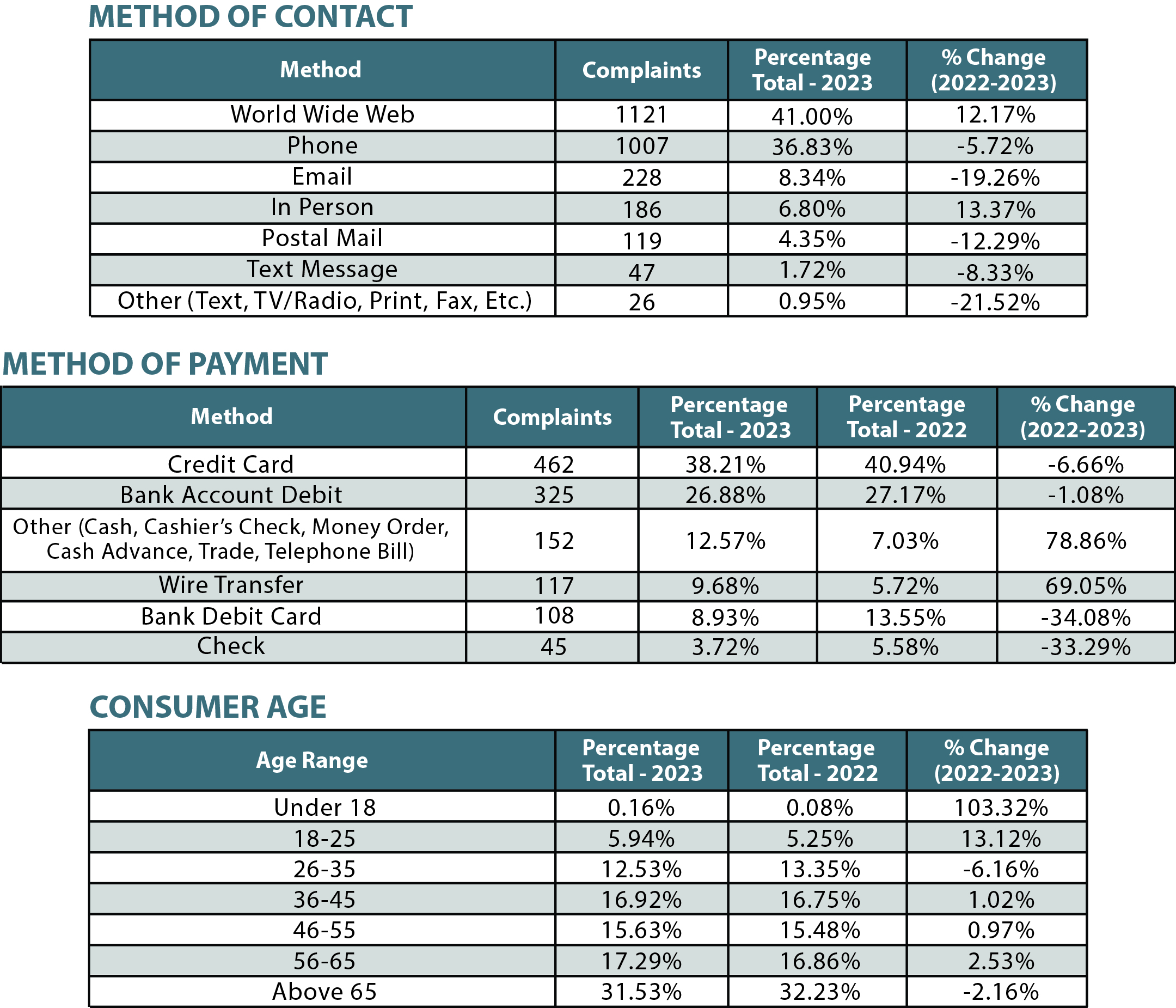About Us
Fraud.org is a project of
The National Consumers League.
info@nclnet.org
(202) 835-3323
1701 K St NW
Suite 1200,
Washington, DC 20006
© Copyright 2025. All rights reserved.
Each year, the National Consumers League analyzes the thousands of complaints received at Fraud.org from consumers and releases it to the public, in order to track trends in scams and to use as an educational tool for fraud prevention.

An alarming growth in complaints involving cryptocurrency-linked schemes in 2023 should make consumers wary of any solici-tations involving cryptocurrencies. The percentage of complaints to Fraud.org regarding crypto-linked scams more than doubled year-over-year and made up nearly 1-in-10 (9.03%) of complaints received. The median loss of $20,000 from such scams was also much larger than other fraud types. Consumers typically first learned of these scams via the web (41% of complaints) or text message (37%).
The top three scam categories reported to Fraud.org in 2023 remained unchanged from 2022 with fake prize/sweepstake/gift scams topping the list, followed by internet merchandise scams, and phishing/spoofing scams. Together, the three scam categories made up more than 60% of all complaints in 2023.
Complaints where consumers reported encountering scammers offline saw some notable increases in advance fee fraud, a scam where consumers are induced to send a payment to receive a promised payout (such as for a loan) which never materializes. The percentage of complaints involving such frauds jumped by 46.47% versus 2022. Also worryingly, complaints involving offline solicitations for fake charities more than tripled, as a percentage of complaints, with many relating to fake rescue operations.
Credit cards and bank account debits remained the two most reported methods of payment, respectively. However, scammers are bringing back old ways to get consumers’ money, with wire transfer complaints increasing 69% and “old-fashioned” cash-based and cashier’s check-based scams showing a 78.8% jump compared to 2022.
This year’s Top Ten Scams report was compiled from more than 2,700 complaints submitted by consumers. No matter what scam a consumer encounters, we always recommend reporting it. Here at Fraud.org, we share complaints with a network of more than 200 law enforcement and consumer protection agency partners. Those partners use complaint data to spot trends, identify gaps in policy, and build cases against scammers. If in doubt, report it!

Advance Fee Loans, Credit Arrangers
False promises of business or personal loans, even if credit is bad, for a fee
Family / Friend Imposters
A scammer calls or emails, claiming that a friend or family member is in distress (in jail, in the hospital, etc.) and urgently needs funds to help
Fake Check Scams
Consumers are asked to cash fraudulent checks and then send the proceeds to a scammer before the check clears
Friendship & Sweetheart Swindles
Con artist nurtures an online relationship, builds trust, and convinces victim to send money
Home Repair
Fake or ineffective home warranties, home protection devices or services, and contractor fraud
Investment (incl. cryptocurrency)
Consumers are tricked into paying money for bogus crypto currency investments
Internet: General Merchandise Sales (not auctions)
Goods purchased are either never delivered or misrepresented
Prizes/Sweepstakes/Free Gifts
Requests for payment to claim fictitious prizes, lottery winnings, or gifts
Phishing/Spoofing
Emails pretending to be from a well-known source ask consumers to enter or confirm personal information
Scholarships/Grants
Offers of fictitious “guaranteed” scholarship or grant funds in exchange for up-front payment or personal information

Methodology
The National Consumers League Top Ten Scams report analyzes 2,756 complaints submitted by consumers to NCL’s Fraud.org campaign in 2023. This data is self-reported and should not be considered a nationally representative sample of fraud victims. NCL shares complaint data with a network of law enforcement and consumer protection agency partners who combine it with other data sets to identify trends in fraud and build cases.
The bottom line
Regardless of the type of scam, many instances of fraud can be avoided by remembering the old rule of thumb: If something seems too good to be true—it probably is.
If you ever do have questions about a potential fraud or think you might be a victim of a scam, report it immediately via Fraud.org’s secure online complaint form. Embarrassment or fear of friends and relatives finding out about the crime causes many victims of fraud to remain silent. Only by speaking out can we give law enforcement the tools they need to bring these criminals to justice.
About this report
Fraud.org’s Top Ten Scams report is compiled annually from complaints received directly from consumers. We do not attempt to verify the authenticity of these complaints, nor do they represent a scientific sample. To get more information on these scams or report suspected fraud, please visit Fraud.org.
Fraud.org is supported by the generous donations by members of our community. You can make a secure, tax-deductible gift here.
Fraud.org is a project of
The National Consumers League.
info@nclnet.org
(202) 835-3323
1701 K St NW
Suite 1200,
Washington, DC 20006
© Copyright 2025. All rights reserved.
